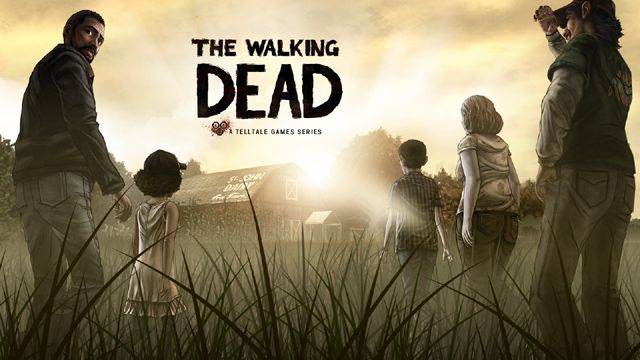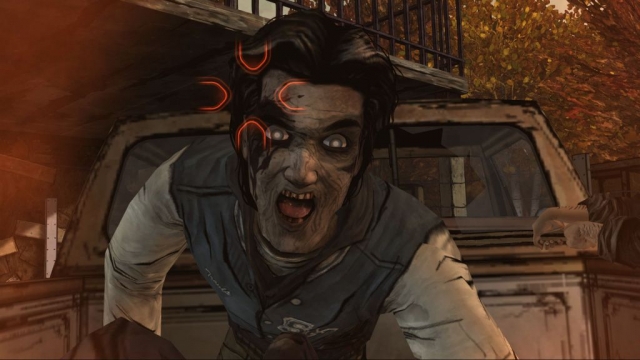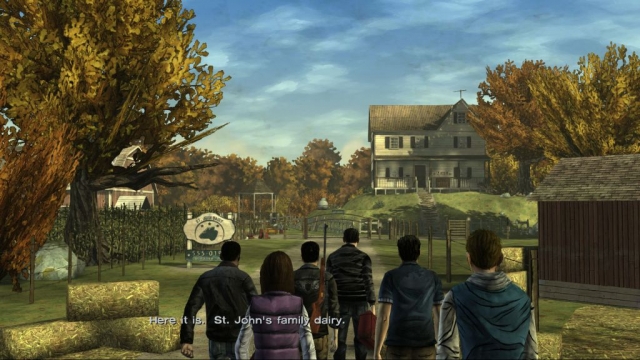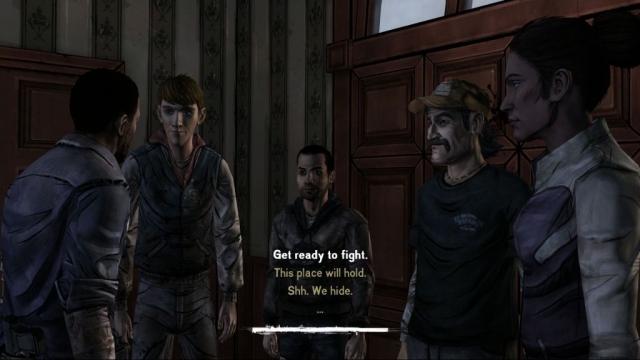The Walking Dead Review

The Walking Dead is the latest episodic adventure game from Telltale Games. It is based on The Walking Dead graphic novels and the AMC television series of the same name, but no knowledge of those other sources is required. The game explains everything you need to know, and since the zombies are so generic — they shamble around slowly and can only be killed by a shot to the head, just like zombies everywhere else — it’s easy to jump into the game and understand what you should and shouldn’t do.
The Walking Dead consists of five episodes. In the first episode you’re introduced to your character, a convicted murderer named Lee Everett, and also an eight-year-old girl named Clementine who you meet while rummaging through a seemingly abandoned house. As the episodes progress, you and Clementine run into other survivors (including Glenn and Hershel Greene in cameos), and you have to dodge zombies, bandits, and worse as you make your way through Georgia looking for a safe place to settle down. For a while you fortify a motor inn, but then when that site becomes untenable, you head to Savannah where you hope to find a boat that will take you somewhere — anywhere — safer to live.
The controls in the game are straightforward. When you’re in adventure game mode, you move Lee using the WASD keys, and you activate hotspots (including other people and inventory objects) by left clicking on them. If you can do multiple things with an object (for example, you might examine or pick up a knife), then the options show up on screen, and you use the mouse wheel to scroll through them. Then when action sequences pop up (which happens whenever you’re attacked), you either press the Q key as quickly as possible to push or grapple with something, or you use the left mouse button to target something with a weapon.
For the most part the game is easy to play. When you’re solving puzzles, there are so few inventory objects and hotspots available that it’s always obvious what you should do next. For the action sequences, a little bit of manual dexterity is required to get through them (especially when you need to click on a moving target), but if you botch things up the game is friendly, and you only have to go back 20-30 seconds to try again. And since the action sequences are always short, it’s easy to memorize the steps necessary to get through them.
In other words, if The Walking Dead had to rely on its game elements, then it would be in trouble, but luckily it shines as an interactive movie. The characters you meet are well-developed and competently voiced — even the ones who don’t survive very long — and they’re given story arcs so you care what happens to them. The writing is also excellent. The game tends to move from one extreme situation to the next, where zombies are often the least of your worries, but while these situations frequently aren’t realistic (especially a subplot involving a “stalker”), they’re probably a requirement to keep the game exciting and to keep players involved.
Better yet, the decisions you make actually have an effect on what happens in the game. These differences aren’t major — the structure of the episodes is fixed no matter what you do — but characters might respond to you differently, puzzles and action sequences might change a little, and different characters might survive or die. As an example, at one point you need to get a character to stop the vehicle he’s driving. If he likes you, then it doesn’t take much to convince him to stop, but if he doesn’t like you, then words might not be enough, and you might need to fight him. Sort of sadly though, even with these differences, the game has little in the way of replay value. I played through the episodes twice, once with an honest and likeable character, and once with the biggest jerk ever, and the changes were so subtle that the second playthrough got a little boring.
The Walking Dead also has a nice look to it. Telltale Games uses a pseudo cartoon style for the graphics, but they do an excellent job with the characters so their expressions (including movements of the eyes, eyebrows and mouth) convey as much information as what they say. The cartoon style also helps to defuse the somewhat gory nature of the game. Characters and zombies get shot, stabbed, gutted, stomped and more, so The Walking Dead more than earns its “Mature” rating. It’s not a game suitable for families.
Overall, I enjoyed the time I spent with The Walking Dead. It’s not a great “game” since its puzzles and action sequences are short and easy, but it has all the right elements — including excellent writing and voice acting — to make it an absorbing interactive movie. Plus, with about 15 hours of content, it’s reasonably priced at $25. So if you’ve been trying to find the perfect Christmas gift for the zombie fan in your family, then The Walking Dead might be just the thing.
Reviewed By: Steven Carter
Publisher: Telltale Games
Rating: 83%
——————————————————————————–
This review is based on a digital copy of The Walking Dead for the PC provided by Telltale Games.
 Game Over Online
Game Over Online











